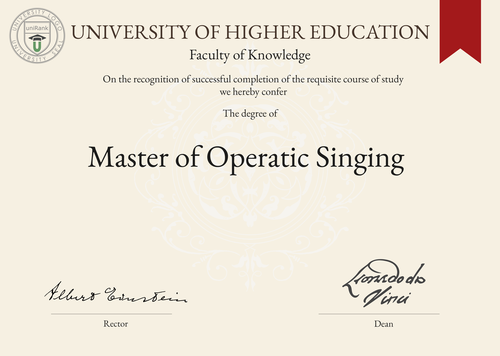
Master of Operatic Singing (MOS)
Guide to Master of Operatic Singing Program/Course/Degree
Master of Operatic Singing (MOS)

Program Name
Master of Operatic SingingProgram or Degree abbreviation
MOSDuration range
The duration of a Master of Operatic Singing program typically ranges from 1 to 3 years, depending on the country and university.Tuition range
The tuition fees for a Master of Operatic Singing program can vary greatly depending on the country and university. It is recommended to check with specific institutions for accurate information.Overview
The Master of Operatic Singing program is designed to provide advanced training and education to aspiring opera singers. It focuses on developing vocal technique, stage presence, acting skills and musical interpretation. Students receive individualized instruction from renowned faculty members and have opportunities to perform in various opera productions.Curriculum Overview by year
The curriculum of a Master of Operatic Singing program is typically divided into different years, with each year focusing on specific aspects of vocal training and performance. The exact curriculum may vary depending on the university, but generally includes: Year 1: Foundations of Operatic Singing, Vocal Technique, Music Theory, Diction, Acting for Opera Year 2: Advanced Vocal Technique, Repertoire Development, Opera History, Stagecraft, Audition Preparation Year 3: Performance Opportunities, Masterclasses, Vocal Coaching, Final Recital PreparationKey Components
The key components of a Master of Operatic Singing program include intensive vocal training, stage performance experience, acting for opera, music theory, diction and repertoire development. Students also have the opportunity to work with professional opera singers and directors, participate in masterclasses and perform in opera productions.Career Prospects
Graduates of a Master of Operatic Singing program can pursue careers as professional opera singers, performing in opera houses, theaters and concert halls around the world. They may also work as vocal coaches, music educators, or pursue further studies at the doctoral level.Salary Expectations
The salary expectations for opera singers can vary greatly depending on factors such as experience, reputation and the specific engagement. Established opera singers can earn substantial incomes, while those starting out may have more modest earnings. It is important to note that income can vary significantly from one individual to another. For a more accurate understanding of salary expectations, you can utilize the Job Sites Search Engine, from our sister site jobRank, which searches over 4,600 job sites worldwide. Make sure to specify not only the job title but also the country you are interested in.Conclusions:
It is important to consider that the duration, tuition fees, curriculum, key components, career prospects and salary expectations of a Master of Operatic Singing program can vary depending on the country or location where the program is studied, as well as the chosen university. Prospective students are advised to research and compare different programs and institutions to find the best fit for their goals and aspirations. Visitors interested in pursuing a Master of Operatic Singing degree can use the uniRank World Universities Search Engine to find institutions offering this specific degree anywhere in the world.World Universities Search Engine
search for Master of Operatic Singing (MOS) and add the Location (country, state etc.) or specific University you are interested in studying at.
Query examples:
- Master of Operatic Singing (MOS) United States
- Master of Operatic Singing (MOS) United Kingdom online
- Master of Operatic Singing (MOS) Australia international students
- Master of Operatic Singing (MOS) University of California
- Master of Operatic Singing (MOS) University of London tuition fees
- Master of Operatic Singing (MOS) University of Sydney scholarships
Share Program/Course
Interesting? Share this program/course/degree info with your friends now.